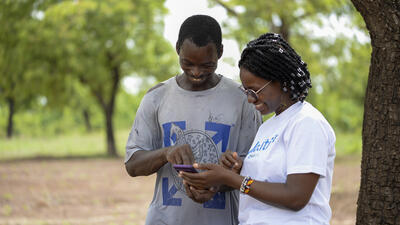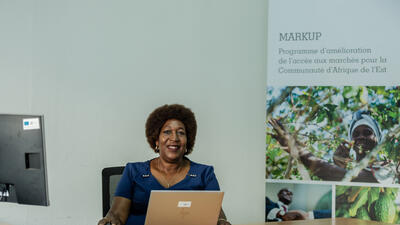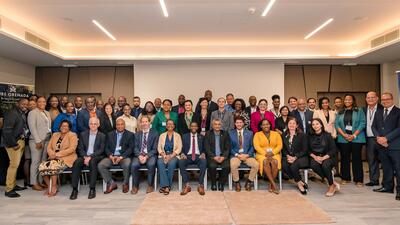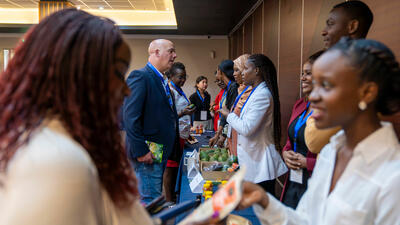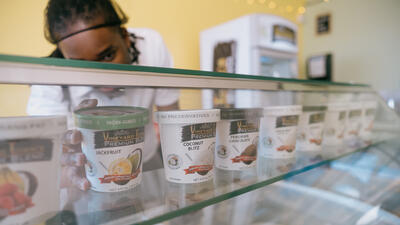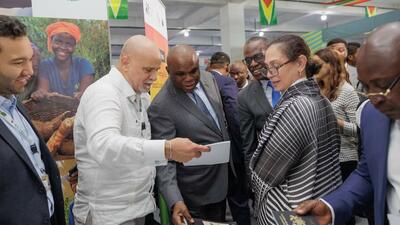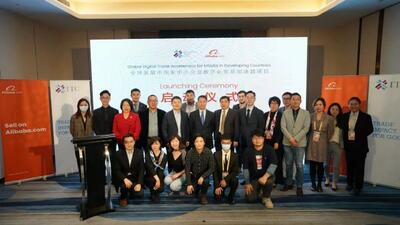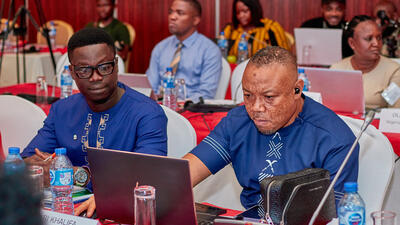
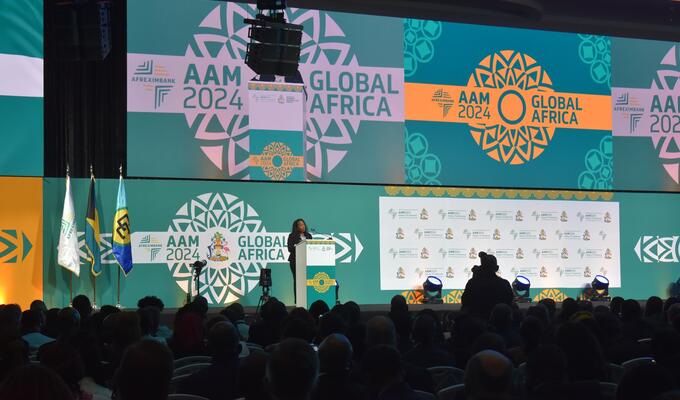
ITC commits to promoting African-Caribbean trade
(Bassau, Bahamas) Executive Director Pamela Coke-Hamilton delivered her opening remarks at the ‘Economic Transformation for Global Africa in a Polycrisis World’ session during the 2024 Afreximbank Annual Meeting and the 3rd AfriCaribbean Trade and Investment Forum.
Distinguished guests, ladies and gentlemen,
Greetings and welcome. I am delighted to be here with you in Nassau, and it’s fitting that we are gathering in New Providence, where we can see evidence of our shared African-Caribbean history all around us. The Junkanoo, the music, the vibrancy, the art—it just comes alive, and it's great to be home.
I don’t need to tell you all about the more painful parts of our shared history, of the slave trade that ripped families apart and cost countless lives, and whose effects have rippled across generations to this day.
For all of us here, myself included, that’s part of the very fabric of who we are.
But it's important in this dialogue to also see this as a spiritual journey, a homecoming rooted in our common ancestry that goes beyond mere economic engagement. From the more painful parts of our history, we can see clearly a new story emerging, a new narrative, as the Vice President (Mr. Denys Denya of the Afrexilbank) just said.
A story of resilience, of creativity, a story of global Africa where the depth and breadth of its diaspora is fully on display.
There are some things in my mind that we must do, not merely because it makes sense, but because it represents the healing and recreation of the whole, without which we continue to wander untethered and uprooted.
I recall my first trip to Abuja. I had been to many African countries before and I enjoyed them all: South Africa, Tanzania, Kenya, North Africa. But when I landed in Abuja, I knew that’s where we came from, at least my set of Jamaicans came from.
It struck me because we all know that Africa is where we came from, but to have that spiritual engagement, that immediate epiphany, this is where we came from. It was the attitude, it was what I called our “in your faceness,” it was the confidence, it was the bravado, it was the inability to understand limits.
I tell people Jamaica has one of the best issues in the world in that our greatest strength is also our greatest weakness, which is that we don't recognize limits on either end. That is awesome, but it can be a problem.
At any rate, for me, that just encapsulated that despite 400-odd years of separation, there is an immediate recognition of where we came from, and that has continued to this day.
Nassau is a great city and has a long tradition of celebrating small businesses and what I call “the hustle.” It’s no surprise that it is this year’s host of the 2024 AfriCaribbean Trade and Investment Forum and the first Afreximbank Annual Meetings to ever take place in the Caribbean.
We've been honored at ITC to take part in the African Trade and Investment Forum since its inception. We will continue to champion this forum alongside you as it goes from strength to strength.
The ties between Africa and the Caribbean are umbilical and organic. It's these ties that can and must carry us through some of the biggest threats that we face, especially in this polycrisis world.
There's, of course, the well-known African saying that “if you want to go fast, go alone; if you want to go far, go together.”
Challenges like climate change bear down on us daily, putting current and future generations at risk. I got into my room at 2:30 this morning. Why? Because the weather in Miami prevented the plane from taking off, and this is just the beginning of the hurricane season, which promises they said, to be one of the worst in decades. I pray they're wrong.
Challenges like supply chain disruptions, food insecurity, environmental degradation, or the aftermath of the COVID-19 pandemic. All of which can undermine years of economic progress in short order.
But if we’re going to tackle these challenges head-on, we need more trade and investment between Africa and the Caribbean. That’s what can make economic transformation possible, and in a way that benefits both regions by drawing on our shared ties, hopes, and potential.
ITC’s newest research with Afreximbank, which we will soon publish, shows that trade between Africa and the Caribbean holds enormous potential—$1.8 billion for goods and services annually by 2028, to be exact.
But we have a long road ahead of us if we’re going to actually achieve that potential in practice, because getting to that number means getting rid of all trade frictions and getting investments into the right sectors.
I was on the bus this morning with one of the venture capitalists who set up in Jamaica. I was really happy to hear that he's already in talks with the Development Bank of Jamaica.
The past decade alone, for instance, shows that the share of African exports that goes to the Caribbean has been decreasing, not increasing. Today, less than 0.1% of African exports go to the Caribbean, and less than 3% of Caribbean exports go to the African continent.
And looking past sheer volume, we can also see that these exports, in either direction, remain far too concentrated in just a handful of sectors with little value addition, like unprocessed chemicals and minerals, despite all that these two regions have to offer.
That’s despite the potential that we see in exports like machinery, electricity, plastics, rubber, processed food products, and mineral products.
And once again, it reflects our colonial history; it reflects the terms of trade that were established 400 years ago and haven't changed. I think one of the fundamental decisions that we need to make as we move forward in planning for 2063 and planning for the future is to undo those terms of trade.
Too often, it’s high tariffs and non-tariff barriers that are holding this export potential back. What’s worse is that these barriers are often more pronounced for those goods that have undergone processing—meaning that value addition, which is critical for better jobs and livelihoods, becomes counterproductive once it’s clear what exporters will face at the border.
It shouldn’t be that way. And it doesn’t have to be.
We must also do far more to boost services trade between the two regions. We already see how trade in travel and transport services are doing relatively well—which, given the extraordinary cultural and culinary traditions our regions have and the beauty of their natural environments, should come as no surprise. There’s a clear foundation we can build on.
Trade agreements are one way to help bring down barriers and open new opportunities. We’ve already got useful precedents that show us what works and what can be improved, such as the economic partnership agreements in both regions with the EU.
And while we need to come together to understand what an African-Caribbean trade framework could look like down the line, we can and must do more to improve economic integration within these two regions themselves, developing value chains further and seeing where the pain points are.
It’s why so many of ITC’s projects in Africa and the Caribbean—whether it’s our new project to support greater food security in the Caribbean or our longstanding projects to develop value chains in East and West Africa—are designed with these goals in mind.
It’s why we have a dedicated programme called One Trade Africa to ensure that small businesses, especially those led by women and youth, can take full part in one of the most transformational trade agreements to be negotiated in a generation—the African Continental Free Trade Area. Together with Afreximbank, we have trained close to 10,000 SMEs through a dedicated online training platform called “How to Export with the AfCFTA.”
It’s why we are launching a new project with Afreximbank to turbo-charge trade and investment between Africa and the Caribbean. Together, we will focus on developing five priority value chains that have major potential for inclusive and sustainable economic transformation, led by the two regions’ small businesses, while tackling food security and other risks we face.
Projects like these have also taught us, however, that value chain development and small business competitiveness can only get us so far.
Too often, poor logistics infrastructure is getting in the way of greater trade both within Africa and the Caribbean and between them. Both regions score the lowest on the World Bank’s Logistics Performance Index, and unless we invest more into changing that, then even our best efforts at spurring greater inter-regional trade and investment will be for nought.
It’s clear that we have a lot of work ahead of us, and it’s not going to be easy. But it’s events like ACTIF where the big conversations—the ones that lead to real change on the ground—happen.
We saw that last year in Guyana, and the year before in Bridgetown. And I know we’ll see that this week in Nassau.
It is why we must begin to explore the possibility of an FTA between Africa and the Caribbean—to remove these artificial barriers and create new opportunities.
I can already hear the naysayers, the prophets of doom, the scoffers in the stands, and the hecklers in the penny section. And that is okay.
I'd like to posit that if a region as small as the Caribbean can negotiate a reciprocal free trade agreement with Europe, then why should we not be able to do one with Africa? As my son would say, "Make it make sense, Mom.”
I recall very well the same dismissal of the nascent pan-African movement led by Dr. Kwame Nkrumah, Jomo Kenyatta, Mwalimu Julius Nyerere, Kenneth Kaunda, and others that initiated a wave of decolonization and independence across not just Africa, but the entire diaspora in the 1950s to 1960s.
That changed the map of the world forever. It's easy to stand on the sidelines and criticize and throw stones, but we have an opportunity to make fundamental change, and that opportunity is now.
I will end by reading one of my favorite quotes because I think it says everything : "It is not the critic who counts; the credit belongs to the man who is actually in the arena, whose face is marred by dust and sweat and blood; who strives valiantly; who errs, who comes short again and again; who at best knows in the end the triumph of high achievement, and who at worst, if he fails, at least fails while daring greatly."
I'd like to ask us all to dare greatly. Thank you.




